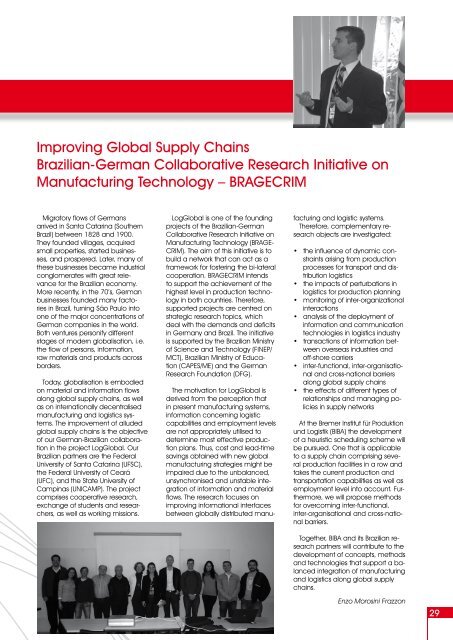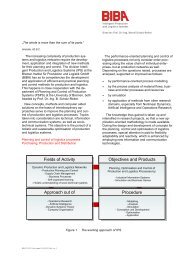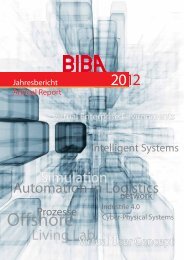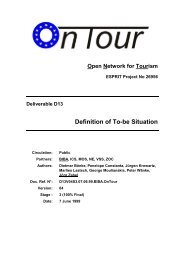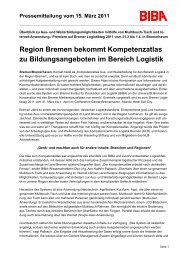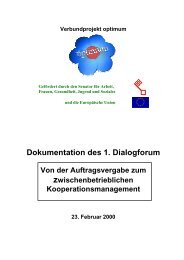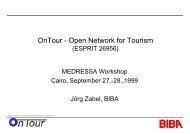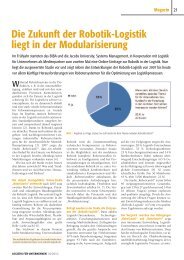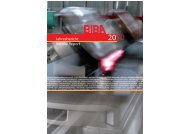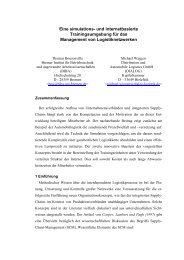Jahresbericht 2009 - Biba - Universität Bremen
Jahresbericht 2009 - Biba - Universität Bremen
Jahresbericht 2009 - Biba - Universität Bremen
Erfolgreiche ePaper selbst erstellen
Machen Sie aus Ihren PDF Publikationen ein blätterbares Flipbook mit unserer einzigartigen Google optimierten e-Paper Software.
Improving Global Supply Chains<br />
Brazilian-German Collaborative Research Initiative on<br />
Manufacturing Technology – BRAGECRIM<br />
Migratory flows of Germans<br />
arrived in Santa Catarina (Southern<br />
Brazil) between 1828 and 1900.<br />
They founded villages, acquired<br />
small properties, started businesses,<br />
and prospered. Later, many of<br />
these businesses became industrial<br />
conglomerates with great relevance<br />
for the Brazilian economy.<br />
More recently, in the 70’s, German<br />
businesses founded many factories<br />
in Brazil, turning São Paulo into<br />
one of the major concentrations of<br />
German companies in the world.<br />
Both ventures personify different<br />
stages of modern globalisation, i.e.<br />
the flow of persons, information,<br />
raw materials and products across<br />
borders.<br />
Today, globalisation is embodied<br />
on material and information flows<br />
along global supply chains, as well<br />
as on internationally decentralised<br />
manufacturing and logistics systems.<br />
The improvement of alluded<br />
global supply chains is the objective<br />
of our German-Brazilian collaboration<br />
in the project LogGlobal. Our<br />
Brazilian partners are the Federal<br />
University of Santa Catarina (UFSC),<br />
the Federal University of Ceará<br />
(UFC), and the State University of<br />
Campinas (UNICAMP). The project<br />
comprises cooperative research,<br />
exchange of students and researchers,<br />
as well as working missions.<br />
LogGlobal is one of the founding<br />
projects of the Brazilian-German<br />
Collaborative Research Initiative on<br />
Manufacturing Technology (BRAGE-<br />
CRIM). The aim of this initiative is to<br />
build a network that can act as a<br />
framework for fostering the bi-lateral<br />
cooperation. BRAGECRIM intends<br />
to support the achievement of the<br />
highest level in production technology<br />
in both countries. Therefore,<br />
supported projects are centred on<br />
strategic research topics, which<br />
deal with the demands and deficits<br />
in Germany and Brazil. The initiative<br />
is supported by the Brazilian Ministry<br />
of Science and Technology (FINEP/<br />
MCT), Brazilian Ministry of Education<br />
(CAPES/ME) and the German<br />
Research Foundation (DFG).<br />
The motivation for LogGlobal is<br />
derived from the perception that<br />
in present manufacturing systems,<br />
information concerning logistic<br />
capabilities and employment levels<br />
are not appropriately utilised to<br />
determine most effective production<br />
plans. Thus, cost and lead-time<br />
savings obtained with new global<br />
manufacturing strategies might be<br />
impaired due to the unbalanced,<br />
unsynchronised and unstable integration<br />
of information and material<br />
flows. The research focuses on<br />
improving informational interfaces<br />
between globally distributed manu-<br />
facturing and logistic systems.<br />
Therefore, complementary research<br />
objects are investigated:<br />
• the influence of dynamic con-<br />
straints arising from production<br />
processes for transport and dis-<br />
tribution logistics<br />
• the impacts of perturbations in<br />
logistics for production planning<br />
• monitoring of inter-organizational<br />
interactions<br />
• analysis of the deployment of<br />
information and communication<br />
technologies in logistics industry<br />
• transactions of information bet-<br />
ween overseas industries and<br />
off-shore carriers<br />
• inter-functional, inter-organisational<br />
and cross-national barriers<br />
along global supply chains<br />
• the effects of different types of<br />
relationships and managing po-<br />
licies in supply networks<br />
At the Bremer Institut für Produktion<br />
und Logistik (BIBA) the development<br />
of a heuristic scheduling scheme will<br />
be pursued. One that is applicable<br />
to a supply chain comprising several<br />
production facilities in a row and<br />
takes the current production and<br />
transportation capabilities as well as<br />
employment level into account. Furthermore,<br />
we will propose methods<br />
for overcoming inter-functional,<br />
inter-organisational and cross-national<br />
barriers.<br />
Together, BIBA and its Brazilian research<br />
partners will contribute to the<br />
development of concepts, methods<br />
and technologies that support a balanced<br />
integration of manufacturing<br />
and logistics along global supply<br />
chains.<br />
Enzo Morosini Frazzon<br />
29


